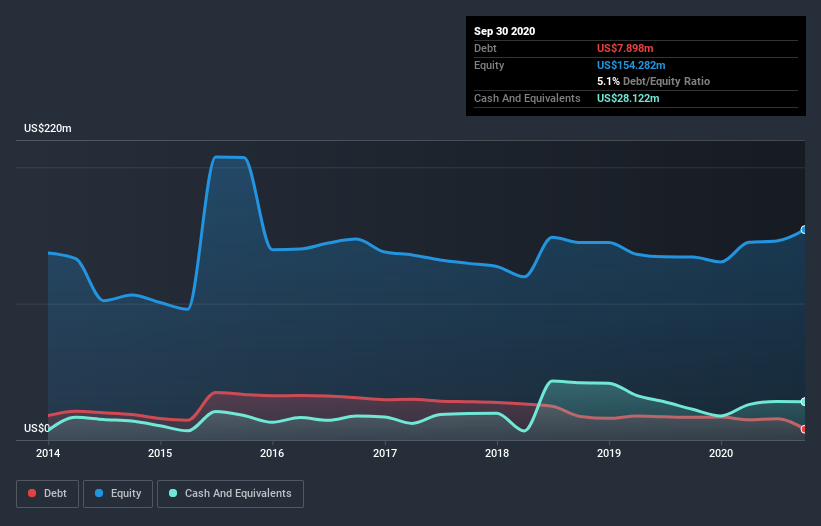The external fund manager backed by Berkshire Hathaway's Charlie Munger, Li Lu, makes no bones about it when he says 'The biggest investment risk is not the volatility of prices, but whether you will suffer a permanent loss of capital.' So it might be obvious that you need to consider debt, when you think about how risky any given stock is, because too much debt can sink a company. As with many other companies Energy Fuels Inc. (TSE:EFR) makes use of debt. But should shareholders be worried about its use of debt?
What Risk Does Debt Bring?
Debt and other liabilities become risky for a business when it cannot easily fulfill those obligations, either with free cash flow or by raising capital at an attractive price. In the worst case scenario, a company can go bankrupt if it cannot pay its creditors. While that is not too common, we often do see indebted companies permanently diluting shareholders because lenders force them to raise capital at a distressed price. Of course, plenty of companies use debt to fund growth, without any negative consequences. When we think about a company's use of debt, we first look at cash and debt together.
View our latest analysis for Energy Fuels
How Much Debt Does Energy Fuels Carry?
The image below, which you can click on for greater detail, shows that Energy Fuels had debt of US$7.90m at the end of September 2020, a reduction from US$16.6m over a year. But it also has US$28.1m in cash to offset that, meaning it has US$20.2m net cash.

How Healthy Is Energy Fuels's Balance Sheet?
We can see from the most recent balance sheet that Energy Fuels had liabilities of US$13.7m falling due within a year, and liabilities of US$20.9m due beyond that. On the other hand, it had cash of US$28.1m and US$964.0k worth of receivables due within a year. So its liabilities outweigh the sum of its cash and (near-term) receivables by US$5.54m.
Of course, Energy Fuels has a market capitalization of US$203.4m, so these liabilities are probably manageable. Having said that, it's clear that we should continue to monitor its balance sheet, lest it change for the worse. While it does have liabilities worth noting, Energy Fuels also has more cash than debt, so we're pretty confident it can manage its debt safely. The balance sheet is clearly the area to focus on when you are analysing debt. But it is future earnings, more than anything, that will determine Energy Fuels's ability to maintain a healthy balance sheet going forward. So if you're focused on the future you can check out this free report showing analyst profit forecasts.
In the last year Energy Fuels had a loss before interest and tax, and actually shrunk its revenue by 76%, to US$2.0m. That makes us nervous, to say the least.
So How Risky Is Energy Fuels?
We have no doubt that loss making companies are, in general, riskier than profitable ones. And in the last year Energy Fuels had an earnings before interest and tax (EBIT) loss, truth be told. And over the same period it saw negative free cash outflow of US$35m and booked a US$32m accounting loss. Given it only has net cash of US$20.2m, the company may need to raise more capital if it doesn't reach break-even soon. Overall, we'd say the stock is a bit risky, and we're usually very cautious until we see positive free cash flow. The balance sheet is clearly the area to focus on when you are analysing debt. But ultimately, every company can contain risks that exist outside of the balance sheet. To that end, you should be aware of the 4 warning signs we've spotted with Energy Fuels .
Of course, if you're the type of investor who prefers buying stocks without the burden of debt, then don't hesitate to discover our exclusive list of net cash growth stocks, today.
If you’re looking to trade Energy Fuels, open an account with the lowest-cost* platform trusted by professionals, Interactive Brokers. Their clients from over 200 countries and territories trade stocks, options, futures, forex, bonds and funds worldwide from a single integrated account. Promoted
Valuation is complex, but we're here to simplify it.
Discover if Energy Fuels might be undervalued or overvalued with our detailed analysis, featuring fair value estimates, potential risks, dividends, insider trades, and its financial condition.
Access Free AnalysisThis article by Simply Wall St is general in nature. It does not constitute a recommendation to buy or sell any stock, and does not take account of your objectives, or your financial situation. We aim to bring you long-term focused analysis driven by fundamental data. Note that our analysis may not factor in the latest price-sensitive company announcements or qualitative material. Simply Wall St has no position in any stocks mentioned.
*Interactive Brokers Rated Lowest Cost Broker by StockBrokers.com Annual Online Review 2020
Have feedback on this article? Concerned about the content? Get in touch with us directly. Alternatively, email editorial-team@simplywallst.com.
About TSX:EFR
Energy Fuels
Engages in the exploration, recovery, recycling, exploration, operation, development, permitting, evaluation, and sale of uranium mineral properties in the United States.
Flawless balance sheet with high growth potential.
Similar Companies
Market Insights
Community Narratives



